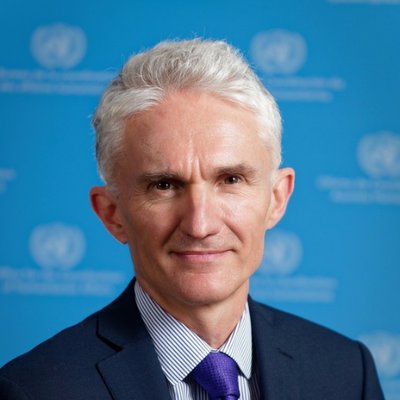News
UN urges Syria to allow aid to 2 million in desperate need

Mark Lowcock told the U.N. Security Council the situation in Idlib, one of the opposition’s last remaining footholds in Syria, is “alarming” with airstrikes, clashes between armed groups, overcrowding and severely stretched basic services. (Photo: Mark Lowcock/Twitter)
The U.N. humanitarian chief on Tuesday urged the Syrian government primarily but also some rebel groups to allow the delivery of aid to more than 2 million desperate people in hard-to-reach areas.
Mark Lowcock told the U.N. Security Council the situation in Idlib, one of the opposition’s last remaining footholds in Syria, is “alarming” with airstrikes, clashes between armed groups, overcrowding and severely stretched basic services.
Idlib has suffered deteriorating security in recent months as rebel and jihadist factions battle with the al-Qaida-linked Levant Liberation Committee for dominance and Lowcock said more than 80,000 newly displaced people have arrived in the area since March.
He said the first convoy in more than two months is due to go to northern rural Homs on Wednesday with assistance for nearly 93,000 people.
France’s U.N. Ambassador Francois Delattre called the humanitarian situation throughout Syria ”alarming,” saying access for U.N. agencies and aid organizations to deliver humanitarian assistance “is still very much constrained.”
In Idlib, he said, there are more than two million people including hundreds of thousands of Syrians evacuated from cities taken back by the government, many who lack “everything” living in over-saturated camps.
“We must do everything we can to prevent Idlib to become a new humanitarian disaster,” he said in a statement.
In the Damascus suburbs of eastern Ghouta, Lowcock said the government asked the U.N. to provide assistance after it retook the former rebel-held area and he released $16 million. But he said the U.N. has only received authorization to visit once since mid-March.
The humanitarian chief reiterated the U.N.’s request to facilitate access, saying the government has approved a convoy to aid 70,000 people in the eastern Ghouta town of Douma, but “facilitation letters have not been provided.”
Lowcock, the undersecretary-general for humanitarian affairs, said the 2 million Syrians in hard-to-reach areas “in places like northern rural Homs, Douma and southern Damascus are some of the most desperate in the country.”
So far this year, he said, only six convoys have reached those area helping 169,000 people, “less than 20 per cent of the people we would like to be reaching.”
Lowcock urged the Security Council to support his office’s efforts to ensure “safe, unimpeded and sustained access” to those Syrians in greatest need.
He lamented that violence against health care facilities and health personnel remain “a grim hallmark” of the seven-year conflict in Syria.
In the first four months of 2018, Lowcock said, 92 health-related attacks have been documented involving 89 deaths and 135 injuries. He also expressed serious concern at reports that medical facilities were attacked shortly after co-ordinated deconfliction efforts were taken to avoid attacks.
Despite all these problems, Lowcock said U.N. convoys provided food to over 2 million people in government-controlled areas last month, and to 850,000 people in cross-border deliveries to rebel areas.





















